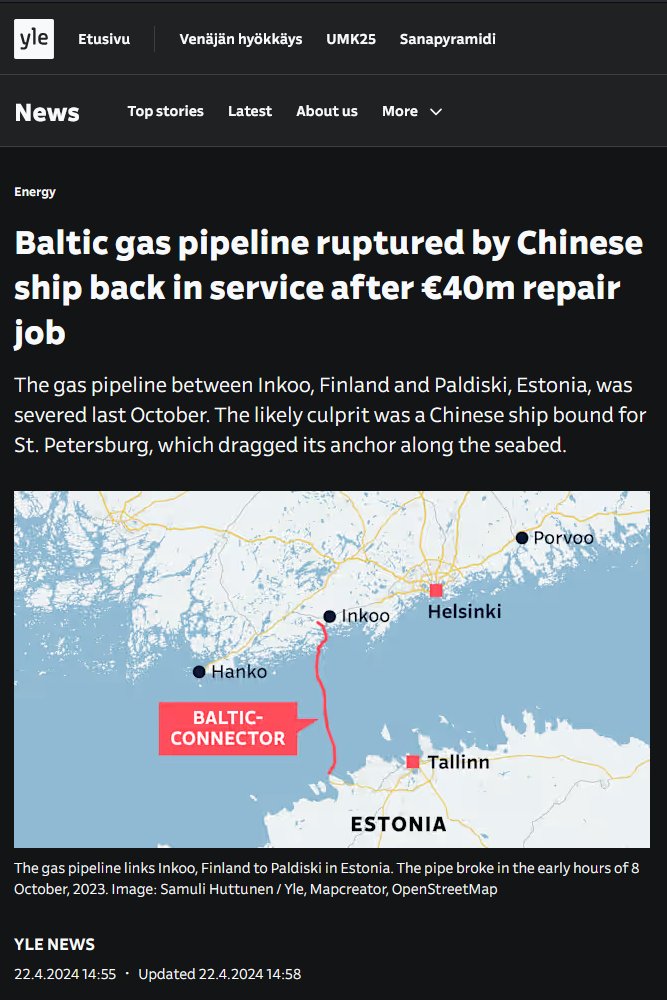In today’s Vatnik Soup, I’ll discuss the Kremlin’s toolbox at sea. Recently, we have seen several sabotage operations allegedly conducted by Russia & its allies, especially in the Baltic Sea region. Since 2023, there have been several underwater cables cut by ships’ anchors.
1/18
1/18

Since Russia’s full-scale invasion of Ukraine,the Baltic Sea has become a hotspot for NATO-Russia rivalry. This rivalry ramped up in Sep 2022,when the Nord Stream gas pipelines were sabotaged by an unknown perpetrator (some blame a “pro-Ukraine group”, others, the Russians).
2/18



2/18




These sabotage operations in the Baltic Sea now target critical infrastructure like Internet and energy cables, links that are vital for European communication and trade. Russia and its allies allegedly use these acts to test NATO’s resilience and response.
3/18

3/18


The Kremlin’s hybrid operations are smart in a way that they almost never cross the red lines for an actual NATO intervention. Cutting a few cables “by accident” hardly calls for an invoking of the famous Article 5, which is why they (allegedly) keep doing these operations.
4/18
4/18

Sabotaging underwater cables is mainly a strategic tool. It undermines regional unity and escalates tensions, sometimes even between NATO allies. Examples abound, including anchor damage to pipelines like Balticconnector, severed in October 2023 by a Hong Kong-flagged ship.
5/18
5/18

Investigations into the Balticconnector suggest deliberate anchor dragging. While China called it an “accident,” suspicions remain. But truthfully, no one will probably be held accountable. In November 2024, a Chinese vessel allegedly severed the C-Lion 1 cable…
6/18

6/18


…near Denmark and Sweden. In December 2024, another incident targeted Estlink 2, a power line between Finland and Estonia. The Eagle S vessel, linked to Russia’s shadow fleet, allegedly dragged its anchor to cut the line. Finland quickly seized the ship and its cargo.
7/18



7/18




“Shadow fleet” refers to a fleet of ships with intricate ownership and management structures, employing a variety of deceptive or even illegal techniques to conceal the origins of their cargo. Russia is estimated to have up to 1400 of these vessels used to avoid sanctions.
8/18
8/18

These acts may aim to provoke an energy crisis in NATO’s Baltic allies. Tensions spiked after the Baltic nations decided to leave the Soviet-era power grid known as BRELL, cutting energy ties with Russia and Belarus.
9/18
9/18

How do we know that these operations were most probably planned in the Kremlin? The Kremlin war hawk Nikolai Patrushev had issued a “warning” over “the US and the UK intending to sabotage underwater Internet cables and planning to destabilize the maritime energy trade”…
10/18
10/18

…just before the incident with Yi Peng 3. Again, the old “Peskov Rule” applies - when Russia blames others for doing something, they’re probably doing it themselves.
Addressing these threats is extremely challenging.
11/18
Addressing these threats is extremely challenging.
11/18

Also, Russia has been for a while trying to minimize the effect of cutting these communication cables: for quite some time, they’ve been testing out their own “sovereign Internet” closed from the outside world:
12/18
12/18
https://x.com/natynettle/status/1676911112032231425

Underwater cables are hard to monitor, and attributing sabotage is even harder. Detection requires tech like drones & sensors, but evidence often remains scarce. Besides, these vessels often sail under flags like the Cook Islands, with the crew coming from countries…
13/18

13/18


…like India and Georgia, so who’s to blame? Also, repairing these damaged cables is slow and costly, involving specialized ships and equipment. These operations are easy to conduct but hard to detect, meaning we’ll likely see more in the future.
14/18

14/18


In Jan 2025, @washingtonpost published a strange article claiming that all these cable disruptions were actually “accidents” and not Russian sabotage.
I think it’s incredible that we barely saw any before 2023, and now it’s happening almost on a monthly basis!
15/18
I think it’s incredible that we barely saw any before 2023, and now it’s happening almost on a monthly basis!
15/18

The article was also heavily criticized by the master OSINT account @auonsson. I would strongly suggest everyone interested in the topic reading their analysis here:
16/18
16/18
https://x.com/auonsson/status/1881097650000536056
Underwater cables have been mysteriously damaged also in Taiwan. The Taiwanese Coast Guard are suspecting that Shunxin39 – a Chinese-linked cargo vessel – could be responsible for cutting the cables.
17/18

17/18


Taiwanese investigators (and later @newsweek) discovered that a Chinese university recently patented a system for cutting underwater cables efficiently. With such tools available, the sabotaging of underwater cables is likely to remain a persistent threat
18/18
18/18

You can now pre-order the 2nd edition of my book! This updated version, featuring pre-order extras, will be released at the end of February 2025.
Pre-order your copy here:
kleart.eu/webshop/p/vatn…
Pre-order your copy here:
kleart.eu/webshop/p/vatn…
• • •
Missing some Tweet in this thread? You can try to
force a refresh

































